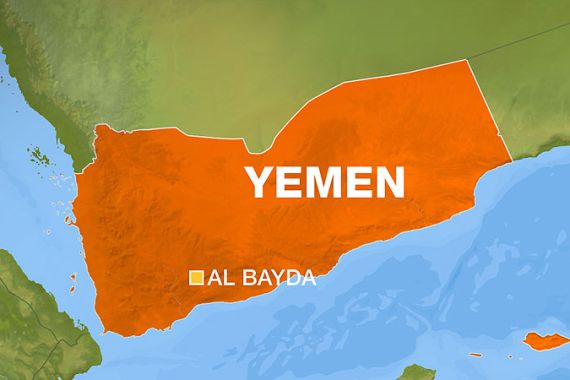‘Local al-Qaeda chief’ dead in Yemen clashes
At least 16 people killed in clashes after Tarek al-Dahab was shot dead by his half-brother, according to tribal chiefs.

 |
At least 16 people have died in clashes that followed the killing of a local al-Qaeda leader during a family dispute in his stronghold southeast of the capital, Sanaa.
The clashes erupted on Thursday after Tarek al-Dahab was shot dead by his half-brother Hizam, in the town of al-Masaneh, a family fiefdom in Bayda province, several tribal chiefs told the AFP news agency.
The slain man’s followers later blew up Hizam’s house, killing him, tribal sources said.
“Al-Qaeda gunmen fired rockets at the house of Hizam, killing him and his brother Majid, as well as their nephew Ahmed,” another source said.
Eleven armed tribesmen were killed when the vehicle transporting them was also targeted, the sources said.
‘Pushed by authorities’
A tribal chief said that Hizam was “pushed by authorities” to kill Dahab who had in January taken over control of the town of Radah, about 130km southeast of Sanaa, and 30km from al-Masaneh.
Dahab was appointed a local “emir” or prince when his gunmen took over Radah. But they were forced to withdraw from the town after holding it for nine days, bowing to tribal pressure.
Tarek al-Dahab was married to the sister of US-born cleric Anwar al-Awlaqi who was killed in a suspected US drone strike in September. Awlaqi was believed to be the leader of overseas operations for al-Qaeda in the Arabian Peninsula (AQAP).
Worsening security situation
In August, the 15-member UN Security Council said it was “deeply concerned at the worsening security situation, including the threat from al-Qaeda”, in Yemen.
AQAP and its local affiliates have taken advantage of almost a full year of deadly protests against outgoing President Ali Abdullah Saleh to bolster their presence in the southeastern Shabwa province and nearby Marib.
Saleh is in the US for medical treatment after being seriously wounded in a bombing at the presidential palace in Sanaa in June last year.
In November, after 10 months of bloody protests, he signed the deal by which he transferred constitutional powers to his deputy Abdrabuh Mansur Hadi who is the sole candidate for February 21 presidential polls that will end Saleh’s 33-year-long rule.